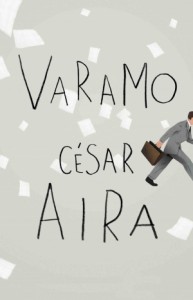On Varamo by César Aira
 Varamo
Varamo
by César Aira
Translated by Chris Andrews
New Directions, Feb 2012
144 pages / $ Buy from Amazon or New Directions
“Long long ago, in the continuum of the world’s reality, two random objects were set apart by a radical heterogeneity. A difference so irreducible no concept could embrace both things. No term except Being. That was how Being came into being, and from then on thought and philosophy existed too, at least until that afternoon in Panama…” when everything came to a halt for an idea. Part creation myth and part scathing satire, the narrator of Varamo is a hilariously tedious literary critic who is telling the story of a ‘bubble in time’ in the life of a government employee. Emphasized as an ‘exception without precent or sequel’, the reader is entered into a moment when the present is made discontinuous with the history and future of the institutions which impose upon time.
The narrator, who tasks herself with revealing the ‘process of inspiration’ behind the protagonist’s masterwork poem “Song of the Virgin Boy,” speculates that on this afternoon in 1923, that the ‘end of thought’ might be at hand, when the eponymous protagonist of Cesar Aira’s Varamo is paid his government salary in counterfeit money. The end of thought?… “But if people didn’t think, how would they occupy their time?” she then asks, a sentence that has plausible attribution to either her or Varamo, whose perspective is so intimate to the narrator’s consciousness as to make him seem the victim of a novella-length coercion. These moments occur often in Aíra’s work; questions arise from the circumstances expressed by the material of plot, but the thrust is orthogonal to the story and lands square on the lived experience of the reader. But the coercion is compelling for the reader, inasmuch as they can detect the parallels in the chosen narration and the metaphorical content of the staged actions.
The imposition of the impossible here does not beset Varamo except at the level of not being able to change his bills, which difficulty is solved serendipitously by the intervention of a publisher interested in his idea. The other impossibility is in the task upon which the narrator sets forth: the total recuperation of the material circumstances of inspiration, drawn from the text of a poem by the protagonist which is left coyly outside the reader’s purview. The free indirect discourse deployed throughout is used to persuade readers that the circuitry of events presently recreated is utterly deduced from the text of Varamo’s poem, a cheap mock-up of one among many idle fantasies of the lit-critical enterprise. Many have picked up on how Aíra is making a sort of sincere mockery of such a project in the novel, but the plausibility achieved in the narration [free indirect discourse, and not coincidentally, throughout], combined with its positioning in time, belies something more than a stylist at work, and tells a tale about the keeping of time in the era before the atomic clock, which never loses a beat.
What seems more interesting than admiring Aíra’s prodigious output and consistently uncanny sense of humor, is the examination of the book that attempts a view of its regard for and situation within chronological time. Aíra’s most recent critical work Las Tres Fechas argues for the importance of the dates of production and of publication, as well as the period of life from which subject matter is drawn, as integral to the reading of so-called minor writers. Varamo was finished in 1999, published in 2002, and the events contained happen in 1923, years that fall conspicuously about one decade before major economic collapses. But dates can only be held up under the premise that time is continuous, that years stand in relation to others and can be be brought into a dialectical relationship with each other. A strange thing Aíra does in Varamo is craft a narrator and story which resist this idea rather strongly. The book takes place in the course of the day, and the ‘act of invention,’ because it occurs in the hours past midnight when birds resemble dark clouds in the sky, is treated as an event that goes without saying. Because the text of the poem is part of common sense curriculum which is second-nature for all SouthAmerican schoolchildren in this universe. There is something that is eerily glossy about the narrator, who is oblivious to the interval between the Panamanian optimism of 1923 and the half-century of military intrusion which culminated with Noriega.
October 18th, 2013 / 11:05 am
